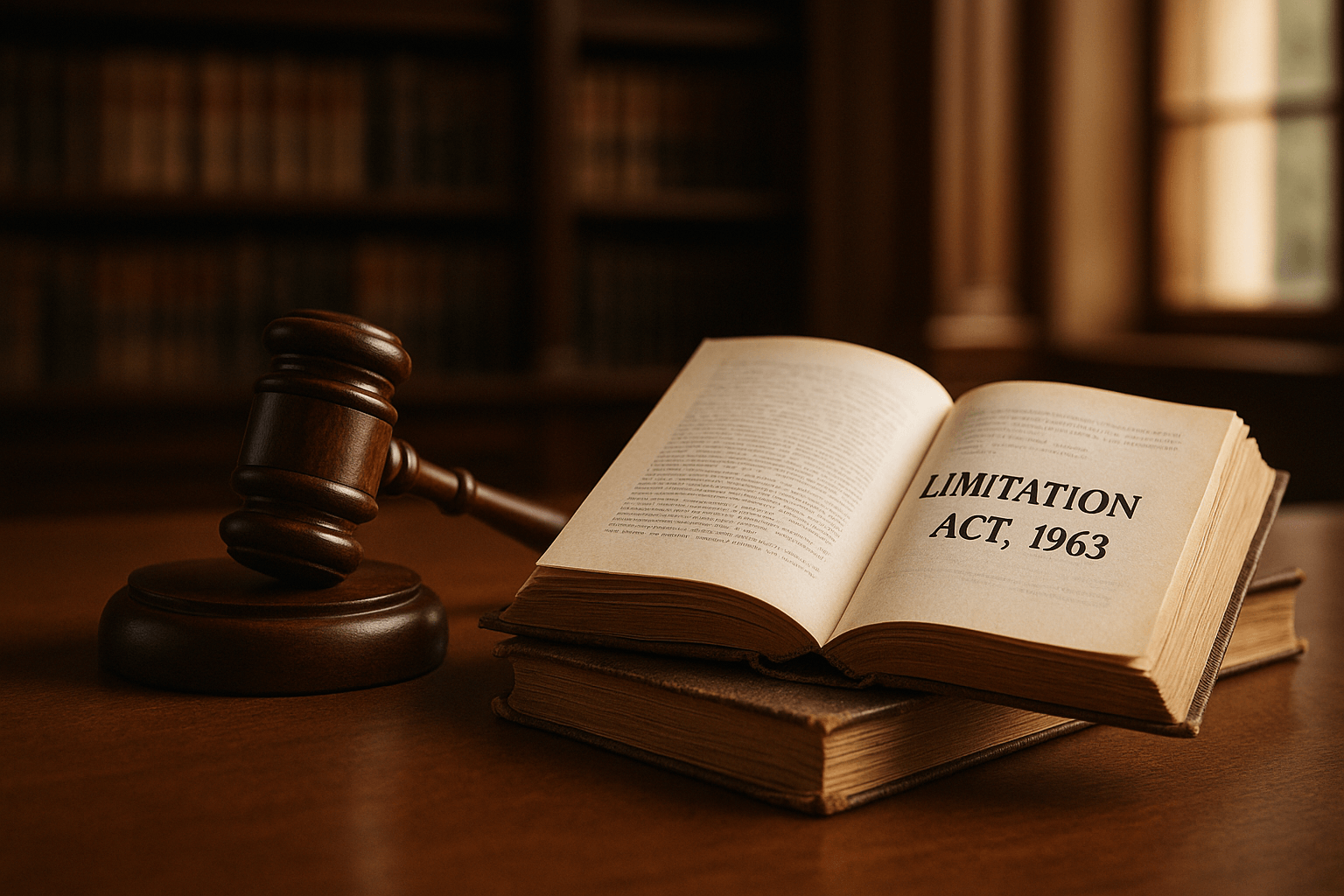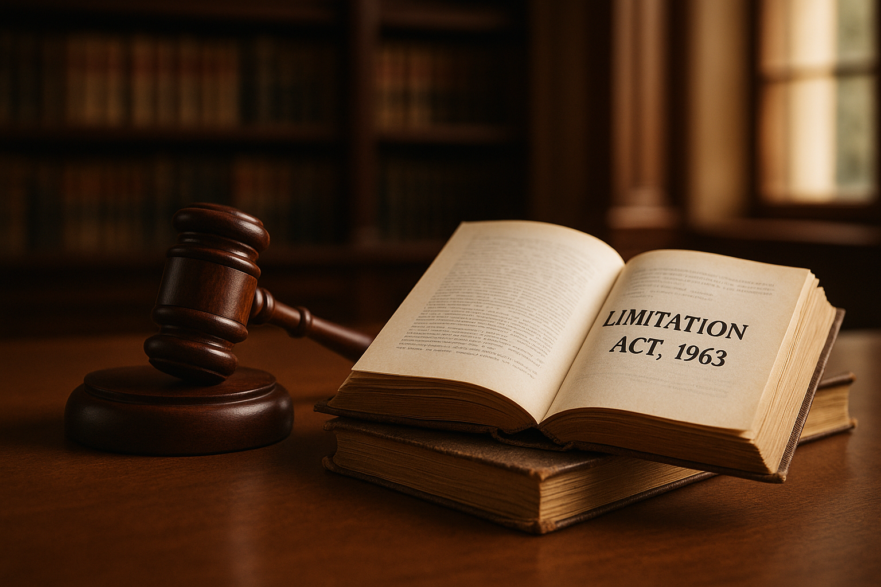
⚖️ RATIONALE OF LIMITATION ACT
Delhi Law Academy Jaipur
📘 TOPICS
- When does the cause of action accrue?
- R.B. Policies at Lloyd’s v. Butler [1949 KBD]
- Interpretation of Limitation Act, 1939
- Policy behind Limitation – protection against stale demands
- English Common Law view on long dormant claims
LONG DORMANT CLAIMS HAVE OFTEN MORE CRUELTY THAN OF JUSTICE IN THEM.
Those who go to sleep on their claims should not be assisted by the Courts in recovering their property.
There shall be protection against stale demands.
Delhi Law Academy Jaipur presents below for aspirants of Rajasthan Judicial Service (RJS), DJS, PCS (J) and other Judicial Services throughout India a very important judgment from English Common Law explaining the rationale of the Limitation Act.
📜 When does the cause of action accrue?
R.B. Policies at Lloyd’s v. Butler [1949 KBD]
J U D G M E N T
This is an action brought by R.B. Policies at Lloyd’s against Mr. Alfred Butler by a writ issued on July 16, 1947, claiming the return of a motor-car which, they allege, has been wrongfully detained by the defendant. When the motorcar was first in the plaintiff’s possession it had registration number JD 6412 and it was stolen from them by some person or persons unknown on June 27, 1940. In January 1947, the car, then bearing the registration number ALN 765, was found in the possession of the defendant, having passed to him through a line of intermediate purchasers during the previous seven years. It is pleaded in the defense that the plaintiffs’ cause of action is barred under the Limitation Act, 1939, by S. 2 (1) of which no action shall be brought “after the expiration of six years from the date on which the cause of action accrued”.
The plaintiffs were the owners of this car and the defendant was an innocent purchaser who acquired it for good consideration and in good faith may years after it was stolen. Where there is any doubt or ambiguity in an Act of Parliament, natural justice shall be done, where there is any doubt about the wording of an Act of Parliament, the words are to be understood in a way which harmonises with the policy of the Act.
In deciding this issue, it become necessary to determine the date on which the cause of action accrued. If it accrued to the plaintiffs as soon as the motor car was stolen so that they then had a cause of action against the thief for conversion or detention, it is contended that under S. 3 (1) of the Limitation Act, 1939, any subsequent detention cannot be the subject of any action.
🕰️ When does the cause of action accrue?
In the present case when the thief stole this car in 1940, clearly he converted it to his own use, and apart from his prosecution for the felony, if he had been known, undoubtedly an action could have been brought against him for conversion of the car then. I have to determine whether it is necessary that there should be an actual, known, and available defendant to such an action before it can be said that the cause of action has accrued so as to fulfill the phrase used in S. 2 (1) of the Act of 1939.
A cause of action cannot accrue unless there be a person in existence capable of suing and another person in existence who can be sued. Is it to be said, because a person is not traceable or is not known that he is not in existence, and cannot be sued? If the thief in the present case had been traceable, he could have been sued, so I doubt whether on that definition it can be said that there was no person in existence who could have been sued. It was, no doubt, a misfortune to the plaintiffs that they could not find a defendant whose name they could insert in a writ, but the fact remains that every other ingredient of the cause of action was present. S. 26 of the Act of 1939, provides:
Where, in the case of any action which a period of limitation is prescribed by this Act…;(b) the right of action is concealed by fraud of any such person as aforesaid…; the period of limitation shall not begin to run until the plaintiff has discovered the fraud…; or could with reasonable diligence have discovered it….
A proviso protects third parties who take for valuable consideration without notice. The section does not say the cause of action shall accrue for the first time on the discovery of the fraud; but only that time “shall not begin to run” until that event. Section 26 is the only provision in the Act of 1939 where a special exception of this nature is made. Prima facie, therefore, if there is a cause of action (as there clearly was here the moment this motor car was stolen), time begins to run as from that moment, notwithstanding the fact that the plaintiff is ignorant of the identity of the thief.
Can it be said, therefore, that, the cause of action being otherwise complete the ignorance of the plaintiff regarding the person who committed the conversion is sufficient to prevent the accrual of that cause of action? I think not, and I agree with the argument of counsel for the defendant. It would lead to appalling results if someone, having lost a watch and discovered it fifty or sixty years later in the possession of a wholly innocent person who had bought it many years previously, was able to bring action for its recovery merely because he did not know who the thief was fifty or sixty years before. I cannot think that that is the policy of the Limitation Act, 1939. I agree that one of the principles of the Act is that those who go to sleep on their claims should not be assisted by the Courts in recovering their property. But another equally important principle is that there shall be an end of these matters, and that there shall be protection against stale demands.
In A’ Court v. Cross [1825] Best, C.J., referred to the policy of the Limitation Act in this way:
From the title of the Act to the last section, every word of it shows that it was not passed on this narrow ground. It is, as I have heard it often called by great judges, an act of peace. Long dormant claims have often more cruelty than of justice in them.
I am not suggesting that the plaintiffs here was guilty of heartlessness or cruel conduct, but a claim made seven or eight years after the loss of the car against a perfectly innocent holder who has given good consideration for it without any knowledge that it was stolen does not seem just. I think that one object of this Act is to prevent injustices of that kind and to protect innocent people against demands which are made many years afterwards. In my view, the proper construction of the words “the action accrued” involves the finding that the cause of action here accrued in 1940 when the car was stolen from the plaintiffs. This preliminary point must, therefore, be decided in favour of the defendant.
***********
📚 Continue Your CPC Preparation
Don’t stop here! Strengthen your knowledge of the Limitation Act with our other fully solved tests:
📘 Free Study Material for Judiciary Aspirants!
Download our FREE study material prepared by Delhi Law Academy’s expert faculty.
💬 Frequently Asked Questions – Rationale of Limitation Act
Contact us
📍 Delhi Law Academy – Jaipur Branch
6C, Tower 2, Coaching Hub, Pratap Nagar, Jaipur – 302033
📞 Phone:
+91 9911916552
+91 8447285606
✉️ Email:
contactus@delhilawacademy.com

